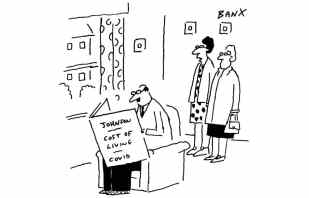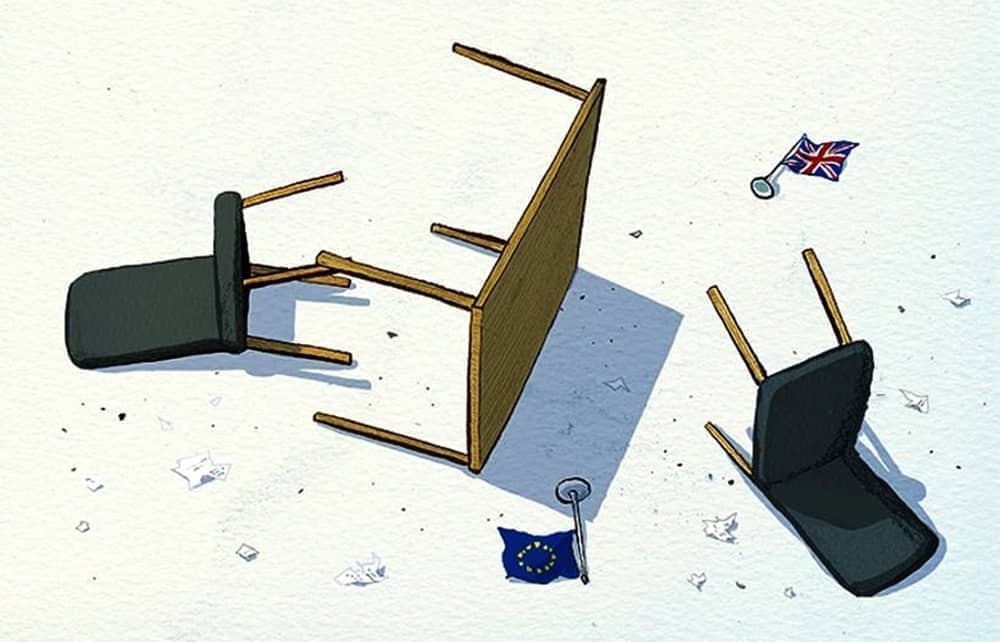In the past few months, relations between the UK and the EU have been the best they have been since Brexit. Vladimir Putin’s assault on Ukraine reminded the two sides of the need for the world’s democracies to co-operate. Disputes over fishing rights could wait.
It is tempting to hope that relations could continue to improve, especially now that the French presidential election is out of the way. But this is unlikely to happen. This week Bruno Le Maire, France’s economy minister, dismissed the suggestion that fixing relations with Britain will be a priority for Emmanuel Macron’s second term.
In Whitehall there is a recognition that there won’t be a dramatic improvement in Anglo-French relations, given how many of the difficulties come down to the personalities of the two leaders. ‘Boris and Macron is tricky,’ one source tells me. ‘They thought they understood each other. They are both zeitgeist politicians.’

If the government’s plan to redirect migrants to Rwanda fails to deter people from illegally crossing the Channel, the small boats crisis will continue to generate tension between London and Paris. The fundamental problem is that France will never be as concerned about migrants leaving its territory as Britain is about those migrants arriving on its shores.
A bigger difficulty for Britain’s relationship with Europe is that the Northern Ireland protocol is about to return to the agenda. The EU thinks that the UK must be made to abide by what was signed and that allowing London to wriggle out of the letter of its commitments would set a terrible precedent. The British view is that the protocol is causing a crisis for Northern Ireland’s devolved institutions. London’s position has also been hardened by the fact that, as one source puts it, ‘the protocol moderates have been undercut by their failure to make progress’. When Lord Frost was the cabinet minister responsible for handling the EU, he wanted to rip up and replace the existing agreement. After his resignation from government in December, his responsibilities were moved to the Foreign Office, which took a less confrontational approach. But it doesn’t yet have much to show for that.
Meanwhile, the protocol continues to cause problems for the government: the plans announced by Rishi Sunak in the spring statement to cut VAT on solar panels and heat pumps in Great Britain can’t be applied to Northern Ireland unless the EU agrees. One of those involved tells me that the Spring Statement was ‘the straw that very nearly broke the camel’s back’.
It is tempting to hope that relations could continue to improve. But this is unlikely to happen
In the Queen’s Speech next month the government will set out that it intends to legislate to protect the Good Friday agreement in ‘its entirety’. This is code for unilaterally overriding parts of the protocol if the government deems it necessary. Even some Tories think this move is cynical. They see it as an attempt by Johnson, still weakened by the partygate scandal, to remind his Eurosceptic backbenchers that he is more in tune with them than any potential successor would be. The bill will also face a hard passage through parliament, given opinion in the House of Lords on the sanctity of international agreements.
But the move is, in fact, less dramatic than it looks. The people behind it emphasise that it is designed to see if the EU is prepared to budge. One of those close to the negotiations says that Maros Sefcovic – the European Commission vice-president who is dealing with the Northern Ireland question – ‘just doesn’t have the flexibility’ to address Britain’s problems properly because he only has the mandate for a technical, not a political, negotiation.
There are some in Whitehall who think that the strongest case for new British legislation on the protocol is if it is part of a broader effort to get the devolved institutions operating again in Northern Ireland. They argue that if Unionists’ issues with the protocol are addressed then the DUP will be under more pressure to go into the executive at Stormont even if, as seems likely, Sinn Fein becomes the largest party after next week’s Assembly elections. If the DUP cannot be persuaded to return to a power-sharing arrangement, then there is little chance of getting a Northern Ireland executive up and running.
The UK is adamant that it is looking for the least disruptive way to address its concerns. But the government’s hope that it can act on the protocol without causing a wider upset between the UK and the EU is far-fetched. Much as bilateral relations between Britain and various European countries have improved in recent months, there will be a widespread reluctance to allow the UK to rewrite the agreement it has signed.
A row over this could also end up obscuring other important areas of the UK’s relationship with Europe. Russia’s aggression emphasised the importance of existing security arrangements, such as the Joint Expeditionary Force, the UK-led coalition of Northern European countries, which in recent weeks co-ordinated weapons supplies to Ukraine. The Russian threat also created the need for new arrangements, such as the trilateral partnership between the UK, Poland and Ukraine, formed in February, which is committed to training and equipping Ukrainian forces. Britain’s decision to send lethal aid to Kyiv from January – ahead of any EU country – has been justified by events. If Europe is going to have any success deterring further Russian revanchism, British support will be crucial.
The past few months have shown the benefits of the UK and the EU being good neighbours. Maintaining those relations will require getting beyond the protocol issue. There may be too much mistrust to achieve that. Yet a respectful and productive friendship between the UK and its European partners should be a priority for all sides.







Comments